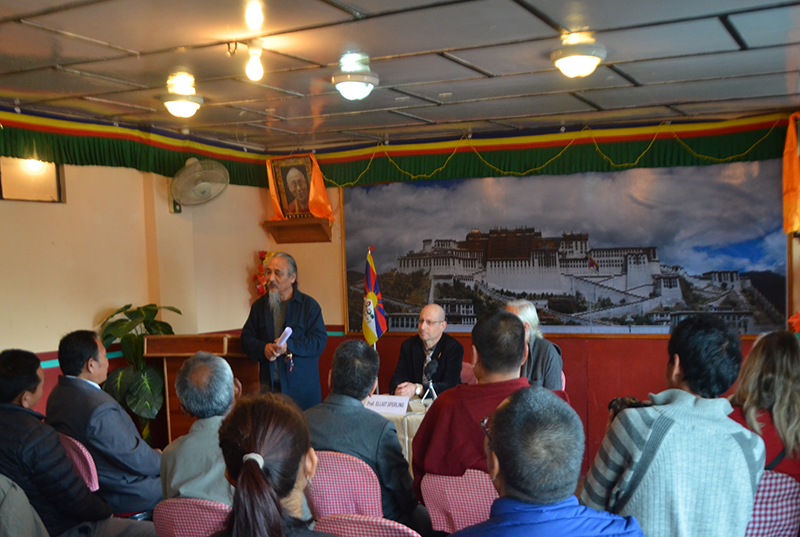 Dharamshala: - Members of the Tibetan community-in-exile gathered at Hotel Tibet on February 23 for the book launch of Trails of the Tibetan Tradition: Papers for Elliot Sperling, a collection of articles on Tibetan culture written in honour of Sperling, a noted scholar on Tibet and Sino-Tibetan relations.
Dharamshala: - Members of the Tibetan community-in-exile gathered at Hotel Tibet on February 23 for the book launch of Trails of the Tibetan Tradition: Papers for Elliot Sperling, a collection of articles on Tibetan culture written in honour of Sperling, a noted scholar on Tibet and Sino-Tibetan relations.
Sperling – who is Associate Professor of Central Eurasian Studies at Indiana University – was presented with the volume of essays by Tibetan historian Tashi Tsering and friend and fellow Tibet academic Roberto Vitali, who edited the collection.
Trails of the Tibetan Tradition took two years to compile and edit, and features writings in both English and Tibetan by twenty of Sperling's colleagues, friends and former graduate students, including Vitali. Subject matter ranges from Tibetan magic rituals to the "dark underbelly" of social life in Lhasa.
Reflecting on the book, Vitali said: "Elliot is a continued source of inspiration to many Tibetans, and his thinking and writing reaffirms that Tibetan culture is here to stay."
Vitali added: "Tibet has such an established, rich and varied culture, and the complex of this amalgam is what we need to preserve. I have no doubt that Tibetans will reclaim Tibet as their own at some point, but while they wait, conditions need to be created that allow them to fully maintain their culture."
Vitali touched on the the positive rise of Tibetan studies in the West. At the 2013 International Association for Tibetan Studies in Ulaanbaatar, Mongolia, over 600 presentations were given from students and teachers from around the world. However, Vitali also stated that there is a danger of "Tibetan studies becoming a container for Western ideas".
"I feel there is the potential for the essential parts of Tibetan culture to become warped through the way it is taught in certain parts of the Western world. People such as Sperling and Tsering stand as custodians of Tibetan culture in its purest form."
Vitali was keen to point out that the book's cover photo, one taken by Sperling of the main chowk in McLeod Ganj in the early 1970s, represents the essence of the volume: "Dharamsala has been the site for many of our generation's first direct encounter with Tibetans and their culture, a formative starting point. It has left a mark upon researchers and definitely upon Elliot, who is keen to remember the deep-seated influence it has had upon him. This place and its people still mean much to him despite the persistent contradictions and unsolved problems."


![Tibet has a rich history as a sovereign nation until the 1950s when it was invaded by China. [Photo: File]](/images/stories/Pics-2024/March/Tibet-Nation-1940s.jpg#joomlaImage://local-images/stories/Pics-2024/March/Tibet-Nation-1940s.jpg?width=1489&height=878)















